
Link building is an essential SEO strategy for ketamine clinics and mental health practitioners looking to improve their visibility in local search results. Websites work on a system of trust, and trust is built with inbound links from other websites to your own, with the aim of boosting your site’s authority and relevance in the eyes of Google. The more links pointing at a website, the more trustworthy Google views that site, and the more highly Google will rank it in search results.
This article will provide key definitions, strategies, and resources to help your ketamine therapy practice reach high search engine rankings.
How Does Google Rank Content?
Google evaluates content using various criteria, such as keywords, relevance, usefulness, and the number of backlinks. This is how the dominate search engine determines which results to display on the SERPs (Search Engine Results Pages).
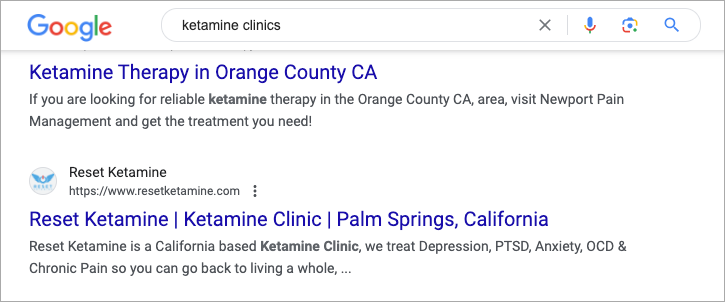
Local SEO is important because many people use search engines to find local businesses. If someone is searching for a local business, like a ketamine clinic, as most prospective patients would be, Google also considers your clinic’s location to provide the most relevant results. This is how they generate those local rankings that display nearby businesses.
-
- 30% of all mobile searches are related to location.
- 78% of people who search for something nearby on their phones visit the business within a day.
- 28% of searches for something nearby result in a purchase.
If you want your ketamine clinic to appear on the first page of Google, you need high-quality content with the right keywords, and a comprehensive local link strategy including backlinks from other websites to improve your ranking.
The correlation between the greater number of referring domains and organic search traffic driven to a website is extraordinarily compelling according to ahrefs.
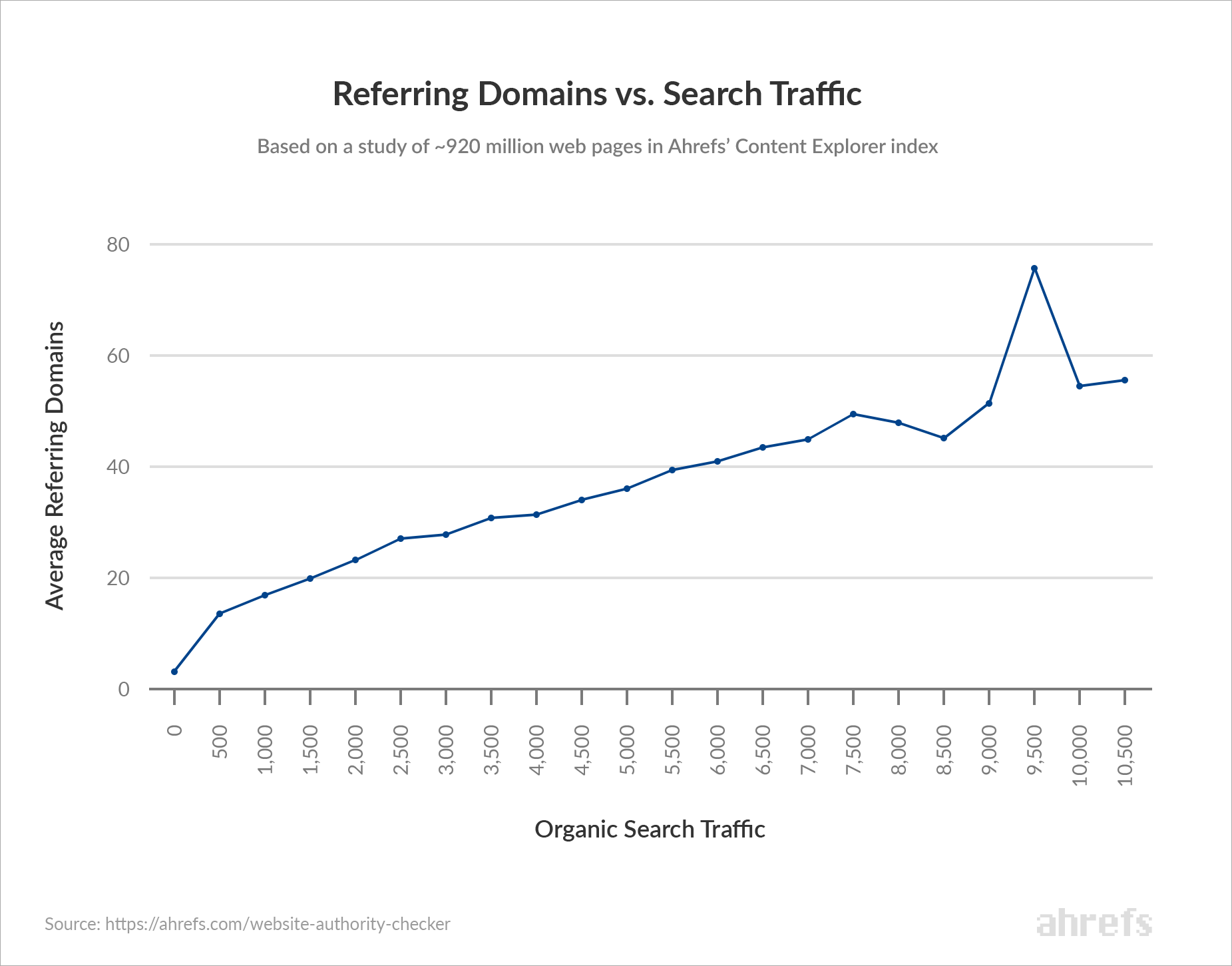
Different Types of Website Links
First, let’s understand the basics. There are three types of links to be aware of when establishing your search engine strategy.
- Backlinks – links that come from someone else’s website to yours
- Internal links – links that direct the readers to the target page on your own website. Connecting relevant pages within your website can improve your Google rankings.
- External links – links that direct the readers from your website to a different website
What Are Local Links?
Local links are done with the intention to show that others with relevance to the local area trust or endorse your business. Local SEO best practices include:
-
- Correcting NAP (Name, Address, Phone number) information.
- Building a list of relevant citations.
- Creating hyperlocal content (including city or vicinity names).
- Building links from websites in the local area.
Understanding the Role of Keywords in Link Building
Keywords play a critical role in link building as they help search engines understand the context and relevance of the linked content. Integrating the optimal keywords in anchor text and implementing a keyword strategy will have your ketamine practice stand out from most others who neglect this effort.
Identifying the Most Relevant Keywords for Ketamine Practices
When thinking in terms of keywords, it’s important to base them not so much on what your clinic does, but what a typical, prospective mental health patient’s intent when searching on Google. So, not necessarily a search for the solution (ketamine therapy) at all times, but the symptom, condition, or related words the searcher is researching, as well.
Keywords for mental health and ketamine therapy providers include, but are not limited to:
- Depression
- Anxiety
- PTSD
- Bipolar disorder
- Schizophrenia
- Treatment-resistant
- Therapy
- Psychedelic assisted therapy
- Ketamine clinics
- Mood disorders
- Trauma
- Chronic pain
- Addiction
- Wellness
- Mental health
What Tools Can I Use in Ketamine Therapy Keyword Research?
There are a plethora of free online keyword search tools you can use to identify the best keywords for your practice and location. Some include:
Broad / Popular Keywords
Semrush is largely considered the best keyword research tool available for its search volume data accuracy and the vast size of its database. Users find it exceptionally useful in monitoring trending terms. Using Semrush’s “Keyword Magic Tool” you can search for a general keyword, as below:

The tool’s output will produce a list containing your keyword along with several other related keywords. The “Volume” column tells you the average monthly search volume for each term, and the “KD %” column gives a score out of 100 to each term, indicating how hard it would be to rank for it.
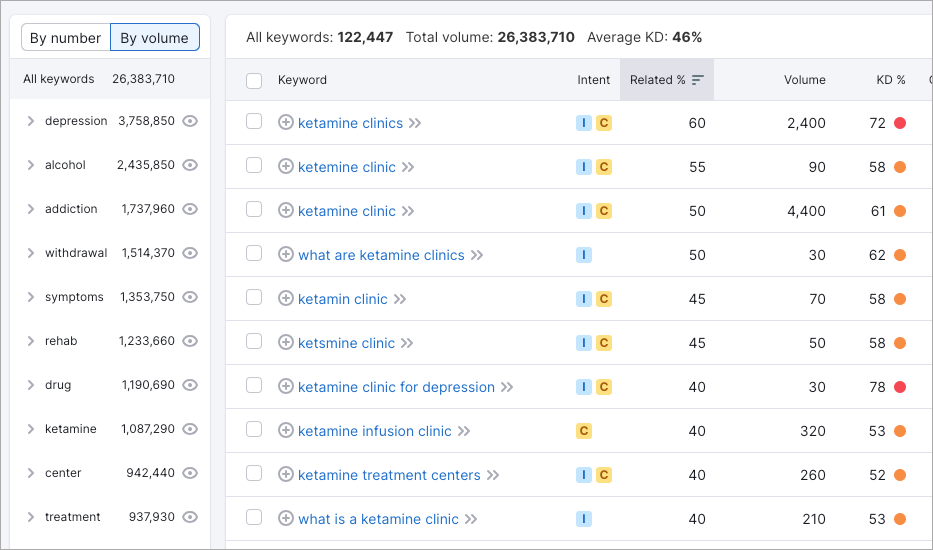
KeywordTool.io: This tool allows you to filter, drill-down, and even expand your keyword results. Moreover, KeywordTool.io will allow you to examine keywords used by competing ketamine therapy clinics. generating a list of keyword ideas based on that site’s content.

Long-Tail Keywords
Long-tail keywords that are more specific than broad topic keywords. For instance, long-tail keywords for “depression” might include “treatment-resistant depression” and “treatment-resistant depression solutions in New York City.” By using long-tail keywords, you might not attract as much traffic compared to other, more common keywords, but you will be drawing in the specific audience you want, and this audience will be much closer to making a purchase.
KW Finder is considered one of the best free local keyword tools for your research, and is excellent for finding long-tail keywords that are easier to rank for than higher volume but more competitive seed keywords.
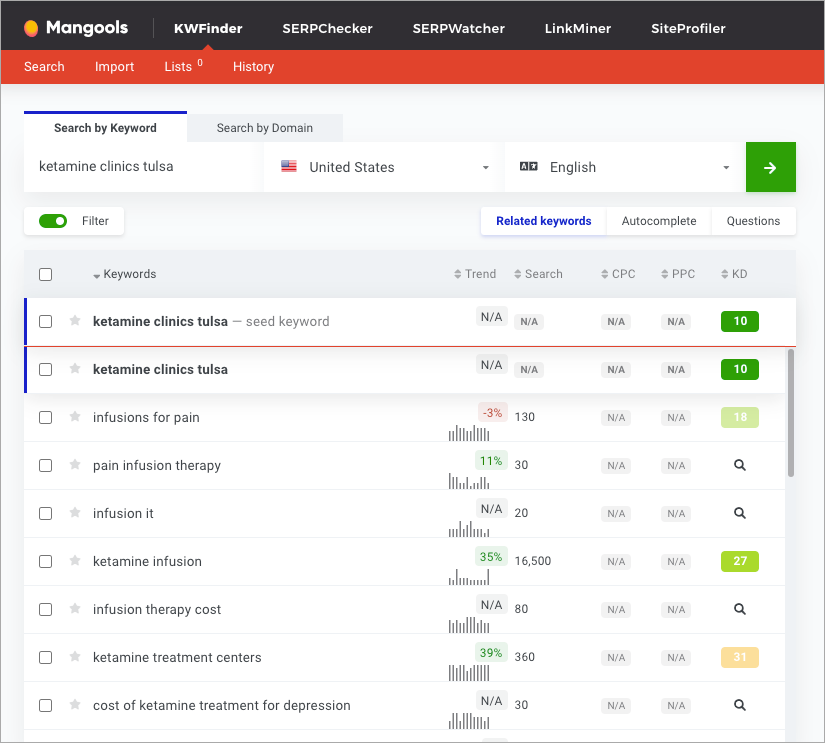
Soovle is another free research tool that uses the auto-suggestion feature to find new keyword opportunities from multiple search engines and sites, including Google, YouTube, Bing, Yahoo, Amazon, Wikipedia, and more. Use it with local keywords to see how you can optimize your ketamine clinic’s website for local searches across multiple local search platforms.
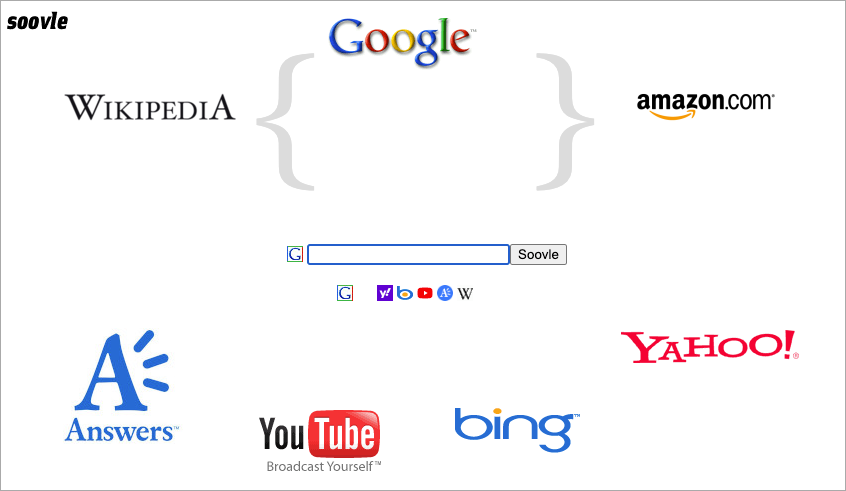
Using the free tool Ubersuggest, you can find out exactly where your competitors links are coming from, and how to use this information to your advantage.
What Is Anchor Text, and How Do I Use It?
Anchor text may seem like a confusing concept if you’re not an SEO expert, but it’s not really. Essentially, an anchor text is the visible and clickable text in a hyperlink that links to another location on the web. It’s purpose is to inform readers what to expect when clicking the text.
Anchor text provides crucial information not only to the reader but also to search engines. It assists Google in understanding your website’s context and offers a distinct understanding of your ketamine clinic’s website and its purpose.
This is how anchor text looks like in HTML: <a href=”https://excellentketamineclinic/blog/best-ketamine-journeys/”>best ketamine journeys</a>
Bad anchor text
An example of bad anchor text would be: “Click here.” Using “click this link” or “click here” as your anchor text will not tell your website visitor what the referred link is about, and can be frequently ignored.
It’s also important to keep your anchor text succinct, using only the essential keywords. Here’s an example of what not to do, because the text is far too long:

Good anchor text
Using a descriptive anchor text, on the other hand, helps Google’s bots understand the context of the linked page, and will help pages rank for queries related to the topic. Consequently, users will have a better idea of what the linked page is about.
Best practices for anchor text creation and use include:
- Keeping your anchors contextually relevant
- Maintaining a natural tone
- Having your anchor texts stand out
- Keeping them brief
- Not over-optimizing or over packing keywords
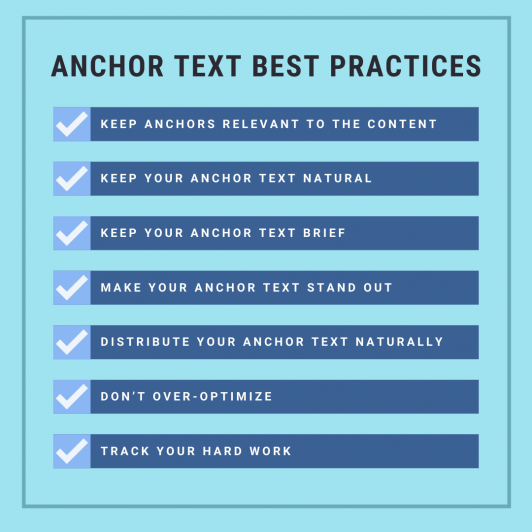
How to Integrate Local Ketamine Therapy Keywords in Anchor Text
Integrating keywords in anchor text is often overlooked by content writers who lack an SEO emphasis. For local-focused ketamine providers, integrating local keywords in anchor text involves using location-specific terms within the clickable text of a hyperlink. For example, if a ketamine clinic in Los Angeles is seeking local links, anchor text such as “Los Angeles ketamine clinic” can signal relevance to both users and search engines.
Here’s a rare example of where a ketamine clinic has applied local anchor text best practices as a guest post on a social networking and social media blog, Speaksitsname.

This approach is valuable for improving your local search engine rankings and driving targeted traffic to your ketamine therapy website. Optimizing your local anchor text helps Google understand the geographic relevance of the linked page, and enhances the searcher’s overall experience by providing clear information within a specific geographic area.
Best Practices for Ketamine Clinic Local Link Building
Local SEO link building can involve obtaining links from local business associations, local news websites, local directories, and other relevant sources. It is also important to ensure that the business’s name, address, and phone number (NAP) are consistent across all of these local listings, as this can further improve their local search visibility.
Consider the following factors when determining the quality of link prospects:
-
- Does the site get much organic traffic?
- Is this website topically-relevant to yours?
- Are its inbound links from high-caliber, high authority sites?
- Are they consistently producing quality, long-form content?
In addition to naturally accruing links, ketamine therapy professionals can actively build links by:
- Listing their website on local directories
- Listing their website on national directories (like Psychology Today).
- Writing Guest Posts for other websites
Content Strategies for Ketamine Clinic Link Building and SEO
Creating, maintaining, and publishing quality, compelling, and pertinent content plays a vital role in SEO for ketamine therapy practices. With a thoughtful approach to content creation, you can offer valuable information and resources to address the needs of your readers and attract a larger pool of potential clients. A solid rule-of-thumb is to follow Google’s Quality Raters’ Guidelines of E-E-A-T (Experience, Expertise, Authoritativeness, Trustworthiness) when creating content to provide practical, actionable advice readers can apply in their lives.
First and foremost, don’t think of “content” as merely written content in the form of blog posts, articles, service pages, FAQs, and location-based pages, for example. Today’s readers prefer to consume a variety of multimedia content types, including videos, webinars, educational resources, and interactive content like quizzes, polls, or surveys.
Video Marketing: An Essential Content Strategy
Video has become an irreplaceable part of most marketing strategies, and content format that service providers and brands can no longer afford to ignore. By openly discussing mental health issues in videos, professionals can contribute to the ongoing efforts to normalize these conversations.
Recent statistics have shown the epic growth in video consumption.
- 75% of people watch short-form video content on their mobile – Source: Inside Intelligence, 2023
- 88% of marketers say video is an important part of their marketing strategy – Source: Wyzowl , 2024
- 52% of companies create videos to educate their audience – Source: Wistia, 2023
- More people are watching videos with closed captions – Source: Yahoo, 2023
- 54% of viewers watching all the way through, and for anything under 60 minutes, video retention rate increases to 62% – Source: Vidyard, 2022
While video marketing isn’t naturally associated with mental health, videos are ideal for sharing on social media channels and front-and-center on your website landing page, delivering excellent first-time experiences for your patients. Moreover, by openly discussing mental health issues in videos, ketamine therapy professionals can contribute to the ongoing efforts to normalize these conversations.
There are several effective video types a ketamine therapy clinic can produce that will resonate to its audience. Creating explainer videos can help you illustrate the ketamine therapy journey procedure with animation or even live-action clips.
Pair that with a personal experience, and you can produce a winning piece of winning content. This live ketamine treatment session for depression video has generated over 1.1M views and 5,000 comments.
Prospective patients like to know who they’ll be working with, and under what types of conditions. Creating a facility tour video featuring your actual staff will help dispel any anxiety an interested client may have.
Thought leadership videos, which share psychedelic and ketamine therapy as new, modern, effective concepts, are also effective in challenging viewers to think of therapy in a new way. When mental health topics are openly addressed by respected experts, individuals are more likely to feel comfortable seeking help and sharing their experiences.
As evidenced by the rise of TikTok, YouTube Shorts, and Instagram Stories, viewers are seeking quick, snappy videos. Specifically, videos under three minutes fall into a sweet spot.
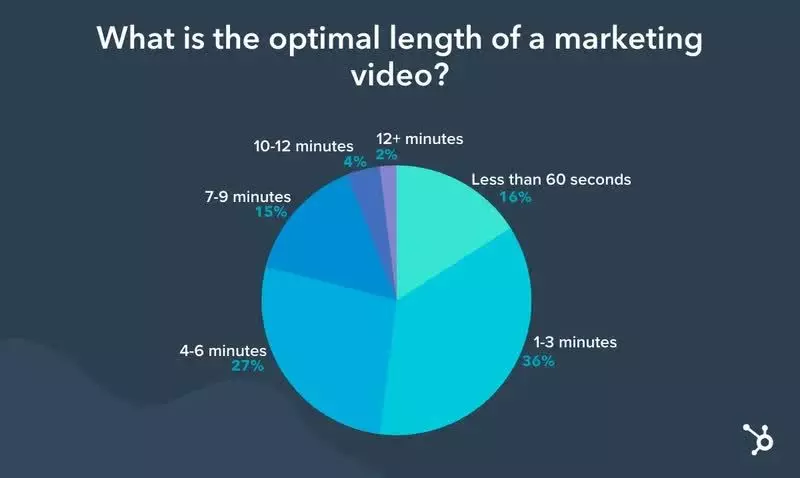
The Effectiveness of Online Quizzes and Surveys
Quizzes and surveys are great tools for user engagement in keeping readers onpage with your website, and your site’s bounce rate minimized. Most quizzes on websites include fun elements to make the quiz interactive and enjoyable, and at the same time an help generate feedback and input from your users.
Quizzes at tool provider, LeadQuizzes, have generated over 4.7M leads and 73.9M quiz questions answered from their marketing quizzes.

Online quizzes can take on a variety of forms and types.
- For swift feedback, constructing a yes-or-no-style quiz is effective, as it is concise and to the point.
- Similar to a yes-or-no quiz, a true-or-false quiz is an excellent method for collecting data when presenting factual or truthful information to your readers.
- Multiple choice quizzes prove valuable for gathering opinions and feedback from users and potential customers.
- Scored quizzes involve traditional questions and answers, culminating in the generation of results.
- Trivia quizzes are effective at boosting targeted audience engagement and interaction, particularly when the topics are both relevant and interesting to your visitors and align with your business.
You might think, “Do mental health quizzes even exist? And are they boring?” Yes, they do exist, and they can, in fact, be fun and engaging.
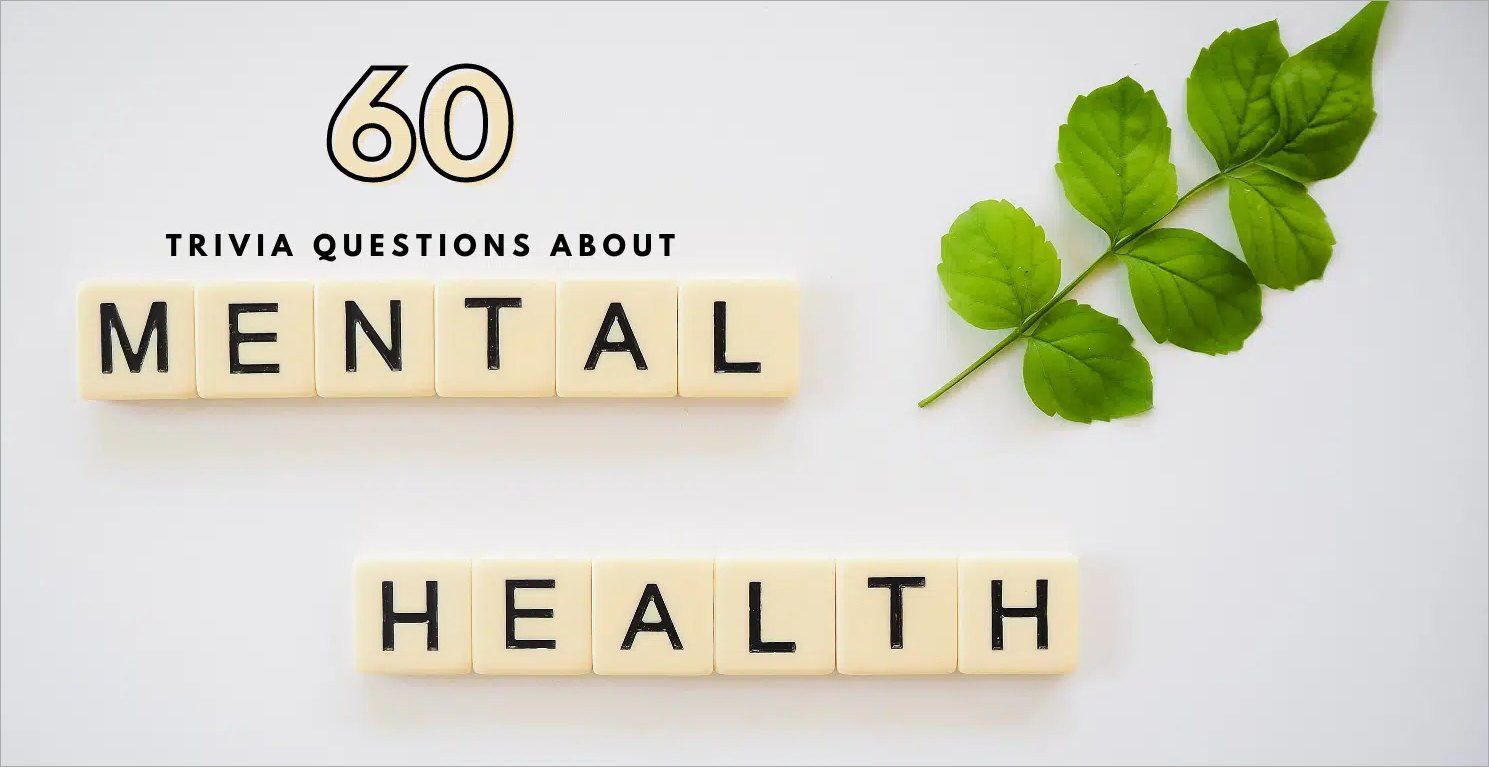
Trivia Bliss’s “Mind Matters: A 60-Question Mental Health Trivia Challenge” is designed to test a quiz-taker’s knowledge of the fascinating and complex field of mental health. Its questions range from historical firsts to intriguing facts about rare conditions, and include things like:
- Who was the first person to use the term “nervous breakdown”?
- What is the rarest mental disorder?
- What is the most expensive therapy form per session?
Live Streaming for Ketamine Therapists
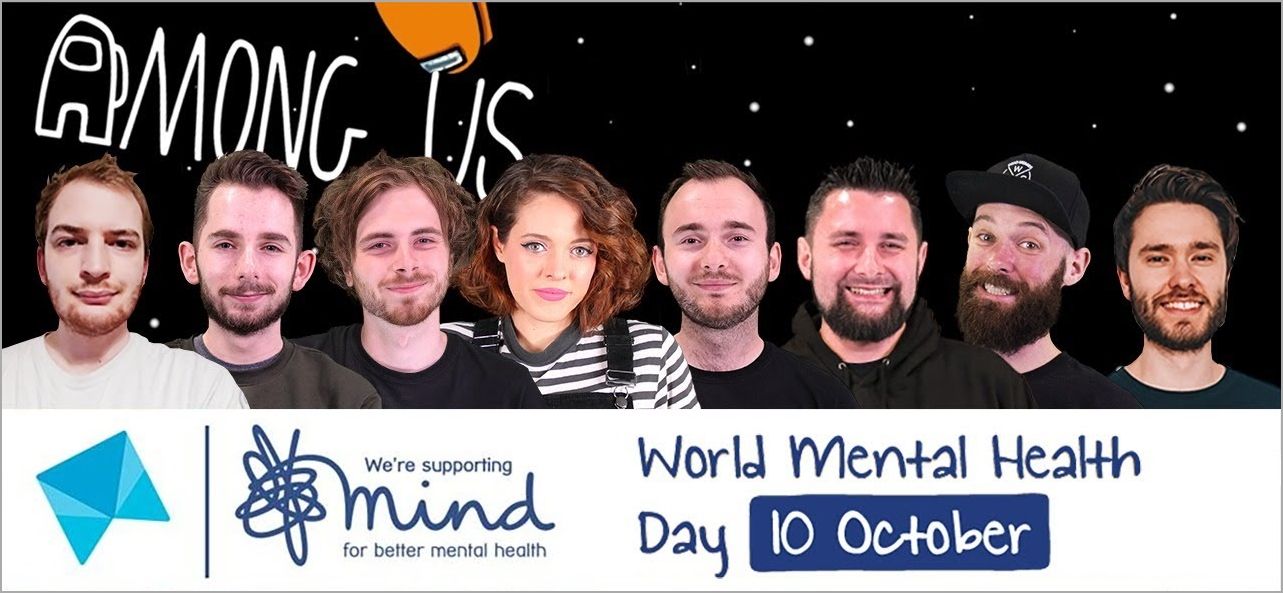
One way to monumentally distinguish your ketamine business from the competition is to plan an informative ketamine therapy live stream on a social platform that allows you to ask an expert questions from those who are commenting on it. Here are some tips for planning an informative ketamine therapy live stream on a social media platform that allows viewers to ask questions:
- Choose an engaging topic related to ketamine therapy that will draw in your target audience. For example, you could discuss how ketamine works in the brain to treat depression and anxiety. Share educational content explaining the science behind ketamine and patient success stories.
- Promote the ketamine therapy informational live stream in advance across your social media channels using targeted ads to reach people interested in ketamine treatment for mental health. Highlight what makes your clinic unique, such as your expertise and personalized treatment plans, to attract potential patients.
- Have a knowledgeable expert, such as a doctor from your clinic or a ketamine therapy practitioner, host the live stream and be available to respond to viewer questions in real-time. The host can share informative content about ketamine treatment and its benefits.
- Encourage viewers to submit questions in the comments, and have the host address as many as possible during the live stream. Engaging with your audience helps build trust and positions your clinic as a reliable resource. Consider collaborating with a mental health influencer who can also respond to questions and share their ketamine therapy experience.
- Monitor the live stream comments closely and have a moderator available to filter out any inappropriate questions or comments. Respond to comments to keep the audience engaged.
- Record the live stream so it can be shared and viewed after the fact. Follow up with a blog post summarizing the key information discussed and linking to the recording.
Promote the recorded live stream across your social channels and website to reach an even broader audience and drive more traffic to your ketamine therapy content. And, remember to comply with regulations around promoting medical treatments on social media. Focus on sharing valuable, educational information rather than purely promotional content.
By hosting an informative, mental health live stream, interacting with your audience, and sharing the recording widely after, you can reach more potential patients, build credibility, and differentiate your ketamine clinic. Consistency is key – aim to regularly share engaging, expert-led content across social media to establish a strong digital presence.
Case Study: A Ketamine Clinic’s Successful Local Link Building
A ketamine clinic in a competitive local market improved its ranking through an effective local link building strategy. By collaborating with local mental health organizations and sponsoring community events, they were able to acquire relevant backlinks from authoritative local websites, significantly enhancing their visibility in local search results.
Additionally, they focused on creating high-quality, informative content related to ketamine therapy and mental health on their website, which attracted links from other local websites and mental health professionals. This strategy helped them to establish themselves as a trusted resource in the community and improve their overall online presence.
By consistently monitoring their backlink profile and making sure they were earning high-quality, relevant backlinks, the clinic was able to maintain their improved ranking and continue to attract more traffic to their website.
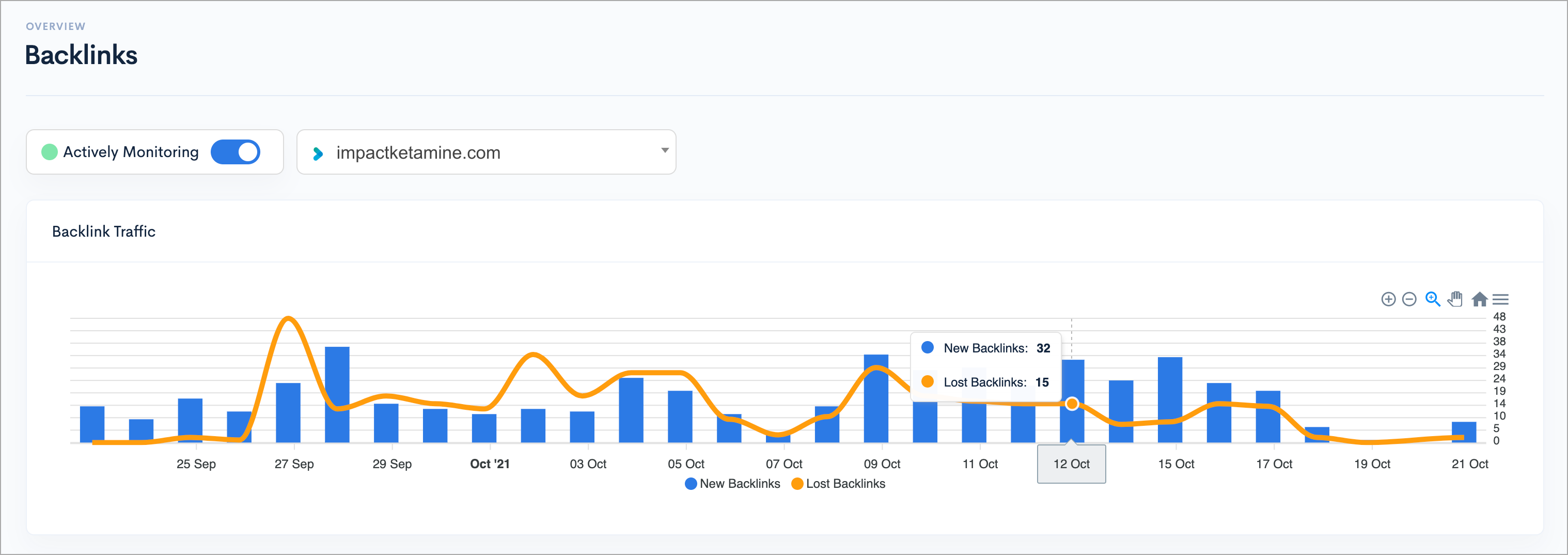
The clinic’s strategic approach to local link building not only improved their search engine ranking but also helped them to build valuable relationships within the local community and establish themselves as a leading provider of ketamine therapy in their area. This ultimately led to an increase in patient inquiries and appointments, and helped the clinic to stand out in a competitive local market.
What were the challenges faced in local link building and how were they overcome?
One of the challenges faced in local link building was identifying and persuading local websites to link to the clinic’s website. This was overcome by demonstrating the mutual benefit of collaborating, whether through content partnerships, event sponsorship, or other forms of community involvement.
What link building tactics worked best for local search visibility?
The most effective link building tactics for local search visibility included sponsoring local mental health events, providing educational resources to local organizations, and executing a content marketing strategy that resonated with the clinic’s target audience. Additionally, actively participating in local community forums or discussions, securing local business partnerships, and creating and optimizing a Google My Business profile can also greatly improve local search visibility.
Engaging with local influencers and obtaining local press coverage can also help to build authoritative backlinks for the clinic’s website. Lastly, leveraging social media to engage with the local community and encourage user-generated content can further enhance local search visibility.
Be Consistent and Monitor Regularly
Exceptional content marketing requires you to maintain consistency and produce and publish prolifically. Why? Because few of your ketamine clinic competitors will be. Do a quick search, scan a few websites, and you’ll find overwhelmingly sparse, short, dated blog posts with minimal SEO effort.
Maintain consistency by producing quality content and you’ll most certainly outpace your ketamine therapy competitors who largely lack digital marketing savvy.
Lastly, Monitor your website’s analytics to identify which content resonates most with your audience. Use this information to refine your content marketing strategy and create more of the content types that generate the highest engagement.


